|
Journal: First Trip to the BCT
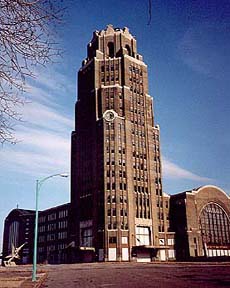 Buffalo Central Terminal (27 February 1999): I went to check out the abandoned Buffalo (New York) Central Terminal with the documentary people and Lefty and L.B. of Jinx magazine.
Buffalo Central Terminal (27 February 1999): I went to check out the abandoned Buffalo (New York) Central Terminal with the documentary people and Lefty and L.B. of Jinx magazine.
I arrived at about 11a.m., and talked with Lefty and L.B. out front just
briefly before we all headed inside the gigantic, decaying monolith of a
building. The front door was wide open, because the film crew had obtained
permission of a sort to film inside the building, but it would have been a
very simple matter to enter the building through an alternate entrance. The
building is absolutely gigantic and there are hundreds of potential
entrances, so I doubt it will ever be sealed off totally.
The crew had secured two cameras and two audio recorders for the day,
so one camera followed the Jinx guys on their mission to conquer the
rooftops (heights are their main thing), while another camera followed me in
my search for tunnels and other interesting sights.
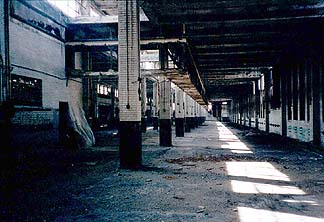 I led my half of the crew back outside and into a long, low building that,
it seemed to me, had served freight trains rather than passenger trains. I
explored several rooms, including unlit storage rooms and extremely
vandalized washrooms, before finding a tall metal ladder leading up. I
clambered up into a very tempting dark hallway where much of the roof had
collapsed onto the floor, and then had to wait impatiently for the film crew
to catch up. We then walked around the top of the building on a catwalk,
which was fun, though I sensed that the people lugging the heavy equipment
up and down the ladders were enjoying all the multi-level action less than I
was.
I led my half of the crew back outside and into a long, low building that,
it seemed to me, had served freight trains rather than passenger trains. I
explored several rooms, including unlit storage rooms and extremely
vandalized washrooms, before finding a tall metal ladder leading up. I
clambered up into a very tempting dark hallway where much of the roof had
collapsed onto the floor, and then had to wait impatiently for the film crew
to catch up. We then walked around the top of the building on a catwalk,
which was fun, though I sensed that the people lugging the heavy equipment
up and down the ladders were enjoying all the multi-level action less than I
was.
After descending to ground level, I found a stairwell leading underground.
At the bottom of the stairs, the top half a wooden door was jutting out of
the floor at an odd angle. As I was about to trust my weight to this
'floor', someone called out "it’s ice!" They were right — the room at the
bottom of the stairs was flooded with about eight feet of frozen water. I
tentatively tested the ice with my foot and, finding it quite solid, crawled
out onto the ice and through the top of a doorway leading into the room
beyond. I crawled through a series of these rooms, right at the roof level,
but they didn't seem connected to tunnels and the crew wasn't really
interested in trusting the ice, so we gave up on that and headed up to
the roof.
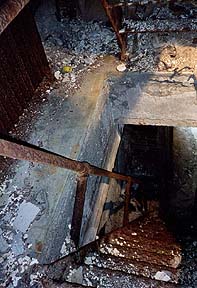
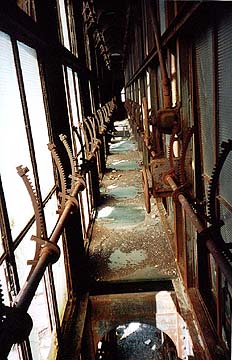
On the roof of the freight building, we looked up and saw Lefty, L.B. and
the other half of the crew standing atop the station’s tallest tower, where
they were draping a flag containing the Jinx logo over the side of the
building. We waved at them and filmed them from below. I spotted a hole in
the cement wall separating the roof of our building from the fourth storey
of their building, so we all climbed through into the main part of the
station. We were in a dark room filled with burned record books and very
narrow staircases leading up and down, and a door leading off somewhere
else. We decided to head down first. At the bottom of those stairs, we found
more doors, more rooms, more stairs! I wanted to go in every direction at
once, but alas, I had to pick. I was generally kind to the crew in picking
the path of least resistance. We climbed down in between the inner and outer
panes of the big arched windows that overlook the station’s great hall.
These were quite shattered, and I grabbed a large, thick hunk of glass as a
souvenir.
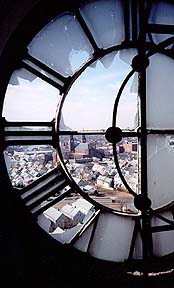 We crossed down to the second storey and did more general tourism. Among the
more memorable sights we took in were a flooded, frozen library filled with
record books and ancient frozen typewriters, an open but empty safe, some
open elevator shafts and several different flights of stairs leading up. We
gradually made our way up the main tower, stopping every couple of floors to
investigate the abandoned offices on a particular level. Some were covered
in charred record books, while others were surprisingly clean. Record books
were in abundance throughout the building; one stairwell we took was coated
with several feet of old record books that we had to climb on top of. We
found the elevators hanging suspended in the shaft on the 9th floor; then
five or six floors higher we stumbled upon the huge clocks that once
broadcasted the time to all of suburban Buffalo. Most of the gears were gone
but the glass-and-iron clock faces were still more or less intact.
We crossed down to the second storey and did more general tourism. Among the
more memorable sights we took in were a flooded, frozen library filled with
record books and ancient frozen typewriters, an open but empty safe, some
open elevator shafts and several different flights of stairs leading up. We
gradually made our way up the main tower, stopping every couple of floors to
investigate the abandoned offices on a particular level. Some were covered
in charred record books, while others were surprisingly clean. Record books
were in abundance throughout the building; one stairwell we took was coated
with several feet of old record books that we had to climb on top of. We
found the elevators hanging suspended in the shaft on the 9th floor; then
five or six floors higher we stumbled upon the huge clocks that once
broadcasted the time to all of suburban Buffalo. Most of the gears were gone
but the glass-and-iron clock faces were still more or less intact.
I failed to note on what storey, but eventually we left behind the office
floors and started hitting the old mechanical rooms near the top of the
building, which were incredibly cool. These were lit with afternoon sunlight
pouring in through windows and holes in the walls, and covered with a thick
layer of dust, so it felt like we were climbing around inside an Egyptian
pyramid. There were ladders and nooks everywhere. We took a relatively
straight path up to the roof, where we had an incredible view of the
decaying metropolis of Buffalo in all its glory from 20 storeys up.
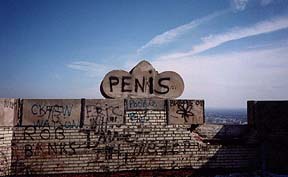 After a little more exploring of the upper levels, we had to head back down
to meet with the other crew. We were setting up for an interview in the
great hall when a couple in their 50s walked in and said hello. The producer
mentioned that we were filming a documentary, and the couple offered to
leave, but we encouraged them to stay and have a look around. They explained
that they were just back visiting for the memories. The terminal had been
where the man had shipped off to the Korean War, and it was even more
significant to the woman, whose first husband had been killed in an accident
while working there as a mechanic decades ago. The man talked about how
they'd just been to Toronto and it seemed so big and prosperous that it made
them sad for Buffalo, which had once seemed to be a city poised for
greatness. They reminisced at length about how the great hall had once been
continuously filled with thousands of people, and dozens of busy shops and
restaurants. The man explained that it had always been kept immaculate:
never a ticket or even a cigarette ash on the floor. The woman interjected
that they had always dressed up in their Sunday best before coming to the
train station. The man told us that all the floors had been made out of
polished marble. We scraped off a few centimeters of dirt with our shoes and
showed him that it still was, and I told him that it was still a beautiful
building. They shook our hands, wandered around a bit more and then left.
After a little more exploring of the upper levels, we had to head back down
to meet with the other crew. We were setting up for an interview in the
great hall when a couple in their 50s walked in and said hello. The producer
mentioned that we were filming a documentary, and the couple offered to
leave, but we encouraged them to stay and have a look around. They explained
that they were just back visiting for the memories. The terminal had been
where the man had shipped off to the Korean War, and it was even more
significant to the woman, whose first husband had been killed in an accident
while working there as a mechanic decades ago. The man talked about how
they'd just been to Toronto and it seemed so big and prosperous that it made
them sad for Buffalo, which had once seemed to be a city poised for
greatness. They reminisced at length about how the great hall had once been
continuously filled with thousands of people, and dozens of busy shops and
restaurants. The man explained that it had always been kept immaculate:
never a ticket or even a cigarette ash on the floor. The woman interjected
that they had always dressed up in their Sunday best before coming to the
train station. The man told us that all the floors had been made out of
polished marble. We scraped off a few centimeters of dirt with our shoes and
showed him that it still was, and I told him that it was still a beautiful
building. They shook our hands, wandered around a bit more and then left.
Once the film crew had pretty much run out of film for the day, they got
ready to pack everything up. An eager member of the crew named Ian
and I asked if we could be excused to check out some stairs we'd
found earlier leading down from the kitchen. These stairs took us down three
levels (each of which we probably could've explored for an hour if we'd had
time) to a series of cold, pitch-black steam tunnels deep under the station.
We explored these tunnels as much as we could, but large sections were
flooded and the ice didn't seem very thick. Too bad, because we could see
more stairs ahead of us in one of the inaccessible areas.
Going up a level, we continued our explorations of the station’s
subbasements. There were dozens and dozens of tempting doors, hallways and
staircases that we had to ignore because we didn't have enough time to
investigate everything. We found an old storage room where there was straw
all over the floor and a fridge in the corner; it looked like bums had once
lived there. I found a large-sized pink t-shirt reading “Hard to Please
Lady” hanging from some mechanical equipment and I couldn't help but take
it, because I knew it would make a perfect addition to my wardrobe.
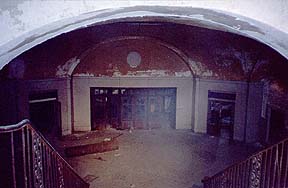 Shortly after this, we wandered outside, into a back alley behind the
station, where we met up with two guys in their 20s who were taking
pictures. They asked us about what the inside of the station was like, and
told us they were taking pictures for a contest a Buffalo art gallery was
having called “images of the Buffalo Central Terminal” or something. They’d
neglected to bring flashlights, though, so they wouldn't have gotten far
inside the building. After a bit of poking around inside the building on the
other side of the alley, a police car cruised by us really slowly on the
other side of a cement wall. The cops obviously wanted us to come over and
explain ourselves, but we didn't feel like it, and they didn't feel like
getting out of their car, so it was a stalemate. We invited the
photographers to come with us back inside the building, and we showed them
some of the more impressive sights we'd seen in the subbasements, like the
corridor containing a car stripped bare, a big subterranean reception hall
of some sort, and cement walls erected halfway up ornate staircases.
Shortly after this, we wandered outside, into a back alley behind the
station, where we met up with two guys in their 20s who were taking
pictures. They asked us about what the inside of the station was like, and
told us they were taking pictures for a contest a Buffalo art gallery was
having called “images of the Buffalo Central Terminal” or something. They’d
neglected to bring flashlights, though, so they wouldn't have gotten far
inside the building. After a bit of poking around inside the building on the
other side of the alley, a police car cruised by us really slowly on the
other side of a cement wall. The cops obviously wanted us to come over and
explain ourselves, but we didn't feel like it, and they didn't feel like
getting out of their car, so it was a stalemate. We invited the
photographers to come with us back inside the building, and we showed them
some of the more impressive sights we'd seen in the subbasements, like the
corridor containing a car stripped bare, a big subterranean reception hall
of some sort, and cement walls erected halfway up ornate staircases.
Unfortunately, we ran out of time before long, and after being lost for a
brief time, we made our way back up to the great hall to meet up with the
rest of our group. Although it had been a long day and I was extremely cold
and hungry (I’d brought drinks but not food), I was still frustrated to have
to leave the magnificent station. We’d been there for about six hours, and I
don't think we'd seen more than a third of what this tremendous place had to
offer. I’ll definitely be heading back.
Continue Back in Journal | Switch to Journal Index
|

